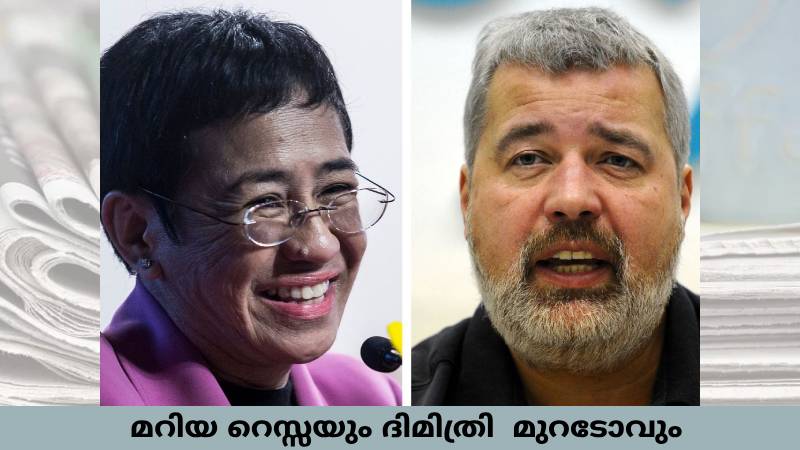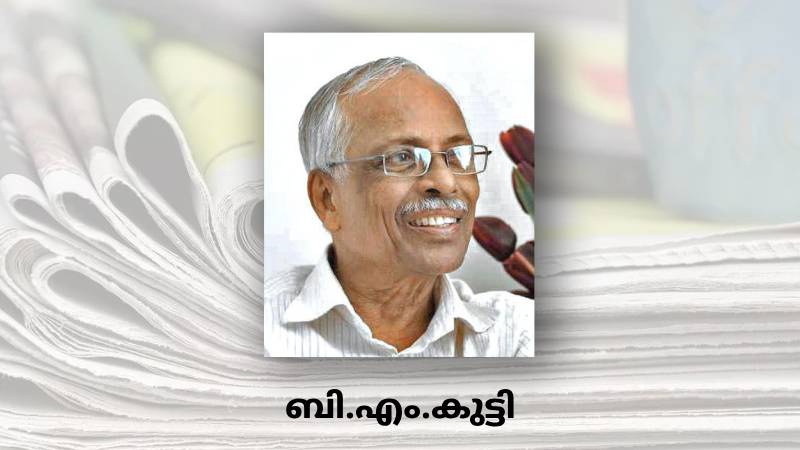If a news item is described as ‘paid news’ it definitely would be seen as a charge against the newspaper. Equivalent to an accusation that it is taking bribe. But, to many who are accustomed to bribing even government hospitals for medical attention, it may not look like big crime. The fact is that many people can’t distinguish between advertisements and news in a newspaper. After all, when a subscriber has to pay to read the newspaper what is wrong if some one pays to get his news published?
No wonder many media barons share this view. Some are even proud to parrot the Murdochian slogan: ‘news is the stuff we use to fill the space in between advertisements’. That means news is less important than advertisements. It is not only the semi literate common man who is not bothered about the ethical complexities of media. Educated and well off elites too don’t bother. Otherwise, how is it that, the media house that does not care a hoot for media ethics runs the highest selling EN newspaper in the whole of Asia? Circulation of a newspaper is in no way related to its credibility. In which language is the most credible newspaper the most circulated one?
But, when it comes to politics and elections, the common men are also concerned. Hence the hue and cry over the issue of ‘paid news’ recently. The last elections saw paid news phenomenon reaching its peak. And, let us be frank, this phenomenon was born the very moment when commercial newspapers were born centuries back. Petty journalists and petty newspaper owners used to publish news of commercial and personal interest, accepting petty remuneration-sometimes in cash, sometimes in kind even in those days when media had not become an industry. That was there in election politics too. There were newspapers which openly campaigned to bring some parties to power and to oust some from power. Was it all done for reasons of ideology or national /public interest ? No. May be money was not paid directly to media owners to take up positions, but financial interest was a reason that prompted the media houses to take up political positions on many occasions. As a friend of mine sarcastically stated, ‘earlier it was post paid, now it is pre paid’. That is all the difference.
Yes, owners are not the only people to be blamed for the unhealthy practice in the media. Before paid news came to be the talking point, money power was all along influencing the tenor and slant of media coverage. It was not the owners, but the journalists who decided whom to support and whom to oppose. Those days mainly the reporters did the mischief. This might have given the owners ideas -why leave the bounty to the journalists when we are the owners, decision makers? This was not confined to politics alone. Reporters were offered junkets, cash and other incentives, at home or abroad in return for favourable reports on a company or an individual. Most of the time, this was done with the knowledge of owners who sometimes used these journalists to extract advertisements in return. Reports gave an impression of being objective and fair, but they never were. No financial reporter will mention anything unfavourable to the organization that had taken him for the costly junket. If this isn’t cheating, what is? Press Council of India in it’s guidelines for financial journalists, had stated that whenever reports are written as a result of sponsored trips, that fact should be mentioned in the report. Have you ever seen such a mention inside any report in any financial paper? Over the years such transgressions have became institutionalized.
How far away is the private treaties of the Bennet Coleman ond company from paid news ? Very intelligently planned and executed, in nice attire and masked as a normal business arrangement, BCCL started it in 2003. Journalists were assigned to cover product launches or personality-related events and that was not based on professional news judgments. They had city-specific colour supplements to carry such paid content which they differentiated as ‘advertorials’ which the common readers saw only as editorial content. If you believe that news is just another product that can be sold and made profit from, then there is nothing to be ashamed of. Many other media companies emulated
such a practice after BCCL started it. There were some articles, some controversies and may be there was a Press Council report. But there was no going back. If PR firms are already “bribing” journalists to ensure favorable coverage, what was wrong in eliminating the intermediary ? There is a point to it, we have to admit!
The SEBI pointed out that “private treaties” may “lead to commercialization of news reports since the same would be based on the subscription and advertising agreement entered into between the media group and the company”. Furthermore, “biased and imbalanced reporting may lead to inaccurate perceptions of the companies which are the beneficiaries of such private treaties”. Hence, the SEBI “felt that such brand building strategies of media groups, without appropriate and adequate disclosures, may not be in the interest of investors and financial markets as the same would impede in them taking a
fair and well-informed decision”. SEBI suggested a lot of measures to combat the commercialization of news. Can the SEBI be more concerned than the Press Council of India in combating evil influences in the media? SEBI will be as powerless as Press Council in executing this task.
There is no doubt that paid news during elections will directly affect the democratic process of the nation. But, we can rest assured that Election Commission (E C) is not just another ‘white elephant’ like the Press Council. E C is a very powerful body with powers almost autocratic in nature and it can swing the sword against the media too. If power is used to eliminate the most pernicious practice of paid news in the election arena, there won’t be any hue and cry about E C attacking the freedom of the press. Newspaper owners may not put forward the argument that freedom to accept money for news also comes under the constitutional right of freedom of the press.
Whether E C can put an end to paid news practices is a point of contention. Even if it is possible, will everything be okay if paid news is eliminated in the election campaign? No, Election Commission will not intervene if newspapers accept money to publish news, before election process begins and after polling is over. This is a very clear. You can take money for all other types of news round the clock, through out the year.
What can the Press Council do? It will publish an enquiry report as has already been done. Chairman of the Council will endlessly demand that it should be given teeth to punish erring media. Do you believe this council is not punishing the media owners who took money only because it has no power? We can not be that naïve. This Press Council had refused to even accept in full, the in-depth analytical report on the paid news phenomenon, prepared by Mr. Paranjoy Guha Thakurta, Mr. Kalimekolan Sreenivas Reddy, both members of the Press Council of India. That was because, the owners in the Council objected the tone and tenor of the report which tore apart the hypocrisy of the media owners. Press Councils are crowded with media owners who honestly believe that media is just another industry with a lot of constitutional rights but no responsibilities. They are not going to punish any media house for any unethical act.
As has been put in the Press Council sub committee’s report, paid news is blatant
deception or fraud. It takes place at three distinct levels. The reader or the viewer is deceived into believing that what is essentially an advertisement is independently produced news content. By not officially declaring the expenditure incurred on planting “paid news” items, the candidate standing for election violates election rules. Finally, by not accounting for the money received from candidates, the concerned media company or its representatives are violating the provisions of the Companies Act, 1956 as well as the Income Tax Act, 1961, among other laws. It is the Press Council that can deal with the first fraud – the reader being deceived into believing that an advertisement is news. But, Press Council is not empowered to punish any one. Only legal experts can say if media can be sued under IPC for cheating if they disguise advertisement as news. Surely, Income Tax Act or Companies Act will be of more use to deal with media corruption. The Press Council Act is not going to be of help in this task.
Corporate houses have taken over the media the world over, but media ethics has not been prostituted to the extend of demolishing the ‘great China wall’ between news and advertisement. But, this is happening in India. The distinction between news and advertisements has been blurred and advertisements double up as news. There is paid news as well as unpaid advertisements. When news is published in favour of a particular political party or a company by selling editorial space, the reader or the viewer is duped. The attempt to influence public debate through the purchase of advertising space and the purchase of favorable editorial comment is the negation of all principles of the fourth estate and democracy.
Paid political news have not yet started in places like Kerala, to the extend it has in north India. This is not because the media people in Kerala are all principled or politicians are a decent lot. Kerala is a politically informed society where such low grade cheating attempts may not work, voters will realize the mischief in it and discard such media and such politicians alike.
It is in non political fields that paid news/paid article phenomenon is roaring in the markets of Kerala. Even the mainstream media carries tall claims by owners of educational institutions, medicine manufactures and many such other businessmen about the high quality of their products. Such reports appear with datelines and bylines, as if they are real news/article and are called ‘advertorials’, a new coinage. Some where down it will be given “feature” in very small letters. Only very shrewd readers will be able to realize that these are advertisements, not news. Business pages of most newspapers contain unpaid advertisements of firms about new products, inauguration on new outlets etc. There is no cheating in it; news is factual but the only problem is that advertisers alone get this special treatment. Editorial space is given as bonus for advertisers. This is part of a package deal reached between media’s marketing officials and businessmen. This sort of blatant violations of journalistic ethics are acclaimed as innovations. Editors look the other way, as if they have not seen it.
Why are the editors not capable of arresting this fall?
Editors are not capable, is the only answer. In this era of cut throat competition in many newspapers editors are mere copy editors. As per the Press and registration of books act Editor is responsible for selection of news as well as everything that appear in the newspaper. As pointed out in the Press council sub committee report (unpublished, but freely available in Internet) ” Until the 1970s and the 1980s, many editors would not brook any “interference” from the management of the company”. That was in the golden period of editorial freedom, when news and editorial content were the most important element in the media. Now things have undergone a sea change. The tribe of editors is an extinct species. Marketing is the primary objective and all else comes second. The growth of the “paid news” phenomenon can be related directly to the diminution of the role and the status of editors in media organizations and the erosion of the freedom enjoyed by journalists.
There is yet another problem. Most of the Journalists are not regular employees in most of the mainstream newspapers. Even senior journalists work under fixed term contracts, they opted out of the protection that was accorded to them under the provisions of the Working Journalists Act. With managers playing a more influential role in the selection and presentation of news, it is not surprising that the importance of the news started getting determined by the revenue it would generate for the company. Journalists are not going to question it. Journalists now look forward to the management, not the editors, for instructions on professional matters.
Media are mostly run by large companies or organizations whose primary aim is to maximise profits. Journalists on the one hand have to succumb to the employers unending quest for profits and on the other hand have to perform his/her role of providing independent information to the public. This is an ethical dilemma.
And this is the crux of the whole problem. And Election Commission has got nothing to do in it.
( Published in KNEC mag Vaartha in Jan 2011)





